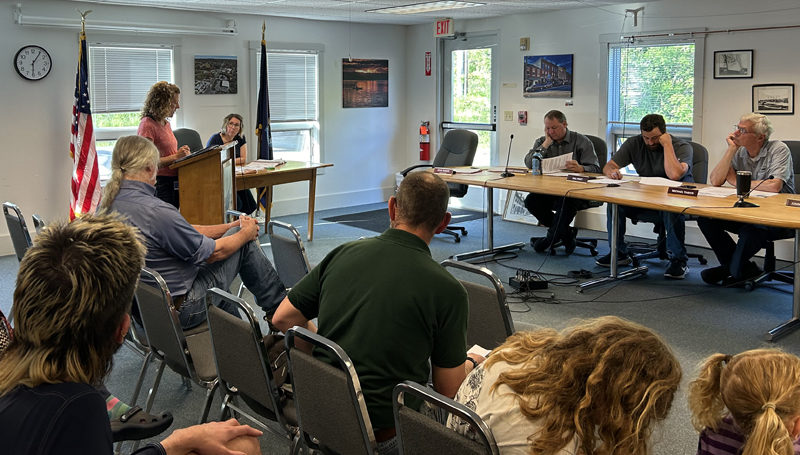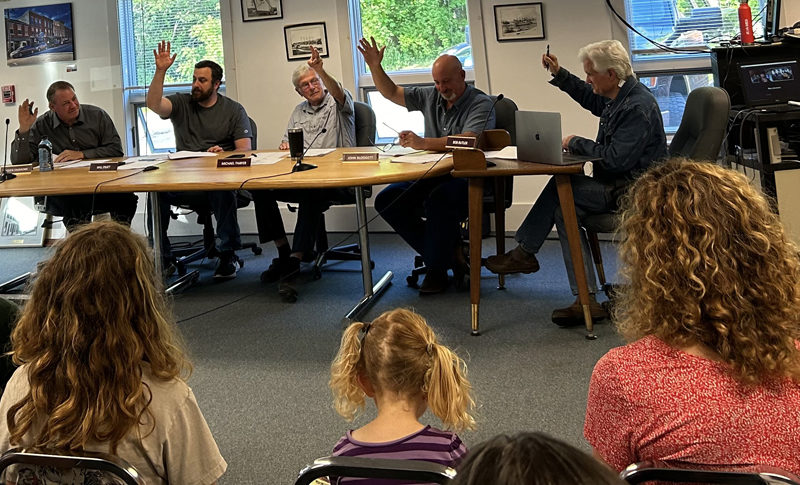
Waldoboro resident and farmer Haley Carmichael (left) speaks to the Waldoboro Select Board about a proposed food sovereignty ordinance on the evening of Tuesday, May 28. “For farms to thrive, we need to create a social, economic, and political landscape that values farming through grassroots organizing and advocacy,” Carmichael said. (Molly Rains photo)
At the polls this November, Waldoboro voters will consider more than presidential candidates, as they will also weigh a potential food sovereignty ordinance. The Waldoboro Select Board voted unanimously to add the ordinance to the November warrant during its meeting on Tuesday, May 28.
“We need this ordinance to protect our rights and to support our rural way of living and our livelihoods of producing quality, local food for our neighbors,” said Haley Carmichael, a Waldoboro farmer who presented a potential version of the ordinance to the board.
As proposed, the ordinance would allow small, direct-to-consumer farmers and food producers to sell certain kinds of food products in Waldoboro without adhering to state requirements for licensing and inspection.
The Maine Food Sovereignty Act, passed in 2017, allows food producers to sell their products directly to consumers without the state oversight traditionally required, as long as the municipality they operate within has a food sovereignty ordinance allowing such activity.
“It helps alleviate the regulatory burdens on our small farmers,” Carmichael said.
She also suggested that the ordinance would help small farmers compete with large, industrialized farms that she said were “harassing” small producers and dominating the food market.
The term “food sovereignty” was coined in 1996 by international small-scale farmer organization La Via Campesina. Maine’s food sovereignty movement began gaining ground in 2011, when towns began adopting food sovereignty ordinances even before state law explicitly allowed them to do so, Carmichael said.
Today, the Maine pro-food sovereignty organization Local Food Rules identifies 113 towns throughout Maine as having adopted food sovereignty ordinances. Carmichael said that number is growing.
Two other Lincoln County towns – Alna and Whitefield – adopted food sovereignty ordinances in 2019. At the time, the ordinance was debated widely in Whitefield, with critics raising concerns about potential food safety risks associated with a lack of oversight.
On May 28, Carmichael said there had been no documented health impacts in municipalities across Maine that had already implemented the ordinance. Personal relationships between sellers and consumers, Carmichael said, would serve as incentives for producers to produce high-quality, safe food.
Deirdre Haren, who sells teas and foods produced on her Waldoboro property at Maine farmers’ markets, said that the ordinance would personally help her cut costs and eliminate the “rigamarole” of licensing requirements that currently constrain her business.
This includes state-mandated use of a commercial kitchen, Haren said, which requires her to go to Brunswick to process her foods despite her desire to process them at home.
Haren said that the various fees required to sell food take her two months of selling products during market season to repay.
“If I was able to not pay for those, and sell to people within Waldoboro, I could provide people with food and teas for way cheaper than they could get at Hannaford,” she said.
Resident Cody Carmichael said that he felt individuals should be able to make the choice whether to buy a regulated or unregulated product.
A motion from board member Michael Thayer to add a food sovereignty ordinance to the November ballot was seconded by board member William Pratt and passed unanimously.
“As a fellow homesteader, I’ve supported this for a long time, so I’m glad to see this,” Pratt said.
The board discussed the language of the ordinance, which board Chair Abden Simmons requested an opportunity to review. Carmichael had provided a version of the ordinance from Local Food Rules for review by the board.

From left: Waldoboro Select Board Chair Abden Simmons and members William Pratt, Michael Thayer, John Blodgett, and Bob Butler vote unanimously to bring food sovereignty before voters this November as resident Haley Carmichael and family look on during the board’s Tuesday, May 28 meeting. (Molly Rains photo)
“This ordinance, to me, was written by Maine farmers,” Carmichael said, saying she was skeptical of an alternative ordinance such as the version supplied by the Maine Municipal Association, which she called a “corporation.”
While some form of food sovereignty ordinance will be on the November ballot, the exact language of that ordinance is still in development and pending select board approval.
Carmichael said she hoped to spend the summer speaking with other farmers and local residents about food sovereignty.
In other business, the select board approved the expenditure of an additional $6,500 from tax increment financing funding to continue an ongoing study of the town’s water system.
Work commissioned in 2023 found that, though the town water system could be extended from its current limit at the intersection of Old Route 1 and Main Street to the intersection of Atlantic Highway and Route 220, the resulting water line would not have enough pressure to be useful, said Town Planner Max Johnstone.
The extension of the system would cost approximately $1.4 million, he said.
“While it is possible, it wouldn’t provide any fire safety, which was one of the main reasons why we wanted to have that extension,” Johnstone said.
The additional study will examine possible corrections to this issue, such as placing a booster station on the portion of the A.D. Gray property still owned by the town.
The housing development planned for the rest of the A.D. Gray property also encountered issues with water pressure on their School Street site, with developer Volunteers of America ultimately deciding to install their own water tanks for protection in case of a fire. Extending the town water system and ensuring adequate pressure, Johnstone said, would help prevent future developments from encountering this issue and provide fire protection for existing structures.
The select board also granted a liquor license for disc golf course and events venue Cider Hill Farm during its May 28 meeting.
The next meeting of the Waldoboro Select Board will be held at 6 p.m. on Tuesday, June 11, at the Waldoboro town office. For more information, go to waldoboromaine.org or call 832-5369.



